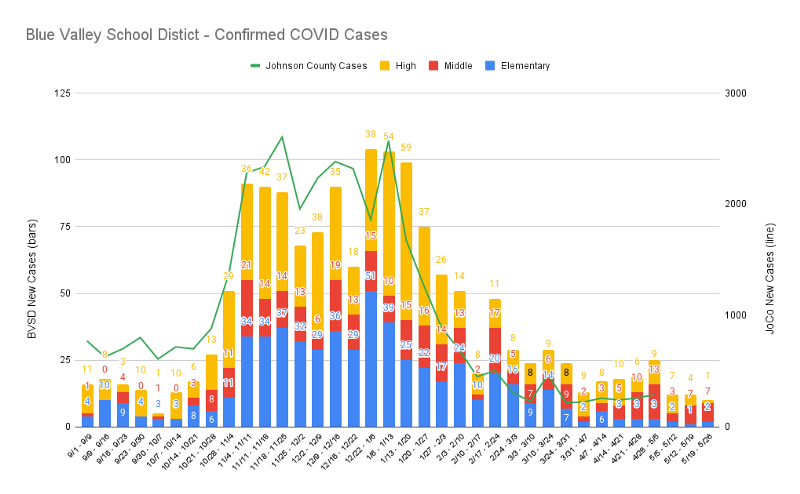
Weekly reported COVID cases, Blue Valley School District, 2020–21 academic year
The Long Tail of COVID Politics
Friday morning of every week of the 2020–21 school year, I transcribed case data from our school district’s COVID-19 dashboard into a public spreadsheet. It started as a personal coping mechanism for understanding the local impact of the pandemic, as I wrestled with whether or not to transfer my child from virtual education to an in-classroom option. It ended in community, local politics, pro and anti-mask protests, and lingering anxiety about what comes next.
Not what comes next for COVID, though; what comes next for our community.
Everything we have lived through in national politics and debates about masks, vaccines, Presidential elections, quarantine rules, travel restrictions, one-way directional arrows on grocery store floors, threats of violence…these were not just Federal affairs. Drama and distrust seeped downward into our states, then our counties, and eventually even our local school boards - each of whom, in our case, was handicapped by a lack of clarity and cultural unity on how to endure a pandemic. The President disagreed with the governor, who disagreed with the legislature, who disagreed with the county commissioners and local department of public health. We have argued, with viciousness and cruelty in some of our voices, for a full year.
Competing cliques of parents and community members, organized around opposing Facebook groups and private collaborations, have rallied around one of two narratives: either masks are a public good, vaccines are a recommended path to normalcy, public policy should follow guidance from the CDC and other well-intentioned scientific groups, and we should elect school board and local officials that can take counsel from advisors more knowledgeable than themselves; or, school boards and county officials are power-hungry and ignoring the will of the group of people that believes masks cause more harm than good. And those who enforced masking should be punished and replaced.
I doubt that our suburban Midwest county is unique in our experience. The existence of quarantines and mask mandates continues to draw angry energy from staunchly conservative circles. Half of our school board opted not to run for re-election this year, and who can blame them? I’ve heard stories of death threats and police protection throughout the year, directed at unpaid neighbors who were just trying to do their best in a crisis.
Some voices from the anti-mask cohort were particularly loud. Those voices are now candidates for the three upcoming open seats. They are coordinated, and still rather angry.
As a member of the pro-mask / pro-vaccine clique, I’ve tried to keep my voice calm, rational, and fact-based. And consistent. It’s been a rewarding experience to share my little spreadsheet with my neighbors, and to provide all of us with a common set of knowledge from which to discuss. (I did try to reach out to the “competing” group, but they declined my invitation. Like much of the rest of modern conservative culture, group membership seems to require conforming to things I can’t abide by.)
What Happens Next?
Today, school districts face three difficult challenges:
- How do we reunify these two deeply opposed subcultures?
- How will our local communities decide they should be governed?
- How do we heal students, both academically and emotionally?
I wish I had answers for any of these issues. I don’t. But I do believe that unless we can rediscover civil conversation and remove the barriers to cross-communication, we won’t make adequate progress on any of these issues. School boards, county governments, and other local elections used to be “little d democracy” affairs. This year, political action committees are investing in school board races as part of long-tail political agendas.
And so: wherever you may live in today’s America, if you care about your city and local community, you need to pay attention to local elections. Treat them with the same reality-TV celebrity obsession we give to national elections. Know who those random names are on the ballot, and what they represent. Because this year, an angry mob is on the ballot. Mobs don’t compromise or negotiate, they make demands; mobs are idealists.
/JSA